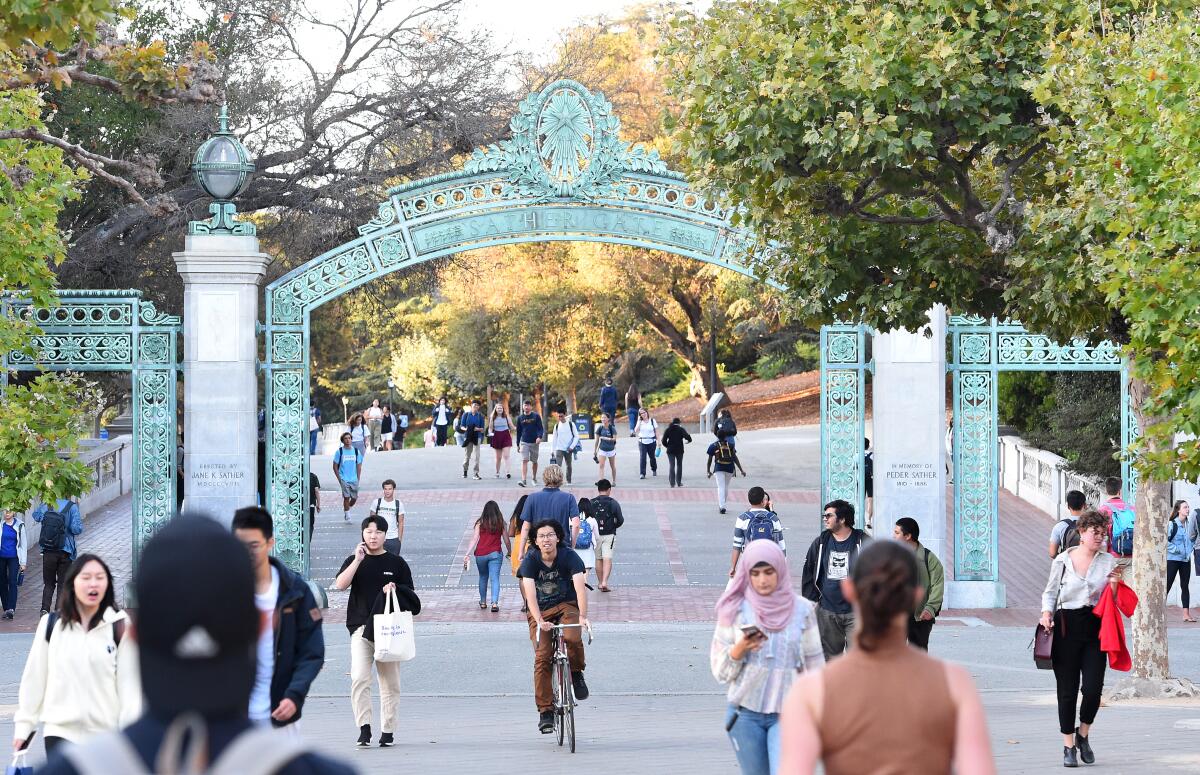UC and CSU campuses to provide cheap abortion pills amid California’s post-Roe push

- Share via
Abortion pills will soon be easily and cheaply available to students at the University of California and California State University under a state law aimed at expanding access to the medication to college students, a move that could become a flashpoint for antiabortion groups vowing to challenge it.
The pills will be available through campus medical centers starting Jan. 1, 2023, when a 2019 law takes effect that made California the first state in the nation to require public universities to offer the pills. The move further cements California’s effort to become a haven for abortion care — specifically servicing a population whose age group makes up the majority of terminated pregnancies. About 60% of abortion patients are in their 20s, according to the Guttmacher Institute, a research organization that supports abortion rights.
“We knew it was important then, but it’s even more important now,” said state Sen. Connie M. Leyva (D-Chino), who authored the bill. “Now, I think it offers bigger ramifications.”
Only a few colleges outside California—including the University of Massachusetts Amherst and the University of Illinois Chicago — have made, or plan to to make, the medication available to students, but abortion rights groups hope the new law will be a model for other states. Up to 6,228 UC and CSU students a year seek a medical abortion, according to a 2018 report from UC San Francisco.
A medication abortion is a nonsurgical way to terminate a pregnancy that involves taking two prescription pills hours apart during the first 10 weeks of pregnancy to induce a miscarriage. It is different than the morning-after pill, which releases a high dose of a synthetic hormone found in birth control pills that delays or stops the release of an egg.
Antiabortion groups that had campaigned against the California law said their fight was far from over. Emboldened by the U.S. Supreme Court’s overturning of Roe vs. Wade, the groups intend to monitor how the new service is unveiled and how students are affected by the medication. Some said they had already retained attorneys to be on the lookout for an opportunity to challenge the law.
The 2019 law was sparked by a grassroots student effort at UC Berkeley, but quickly expanded to the state’s other public universities. The timing of the law’s start means that UC and CSU will expand access to the pill as California abortion clinics grapple with a surge in out-of-state demand for abortion care.
The Planned Parenthood in El Centro sees a surge in out-of-state patients — most from Arizona — seeking abortion care after the end of Roe vs. Wade.
“Not only is it going to be important for students at campuses, but it now frees space for other women from other states who are going to be coming in to get abortions,” Leyva said.
University officials, however, are already raising questions how the shifting legal landscape could affect their plans to carry out the law. Will other states that have floated the idea of banning traveling for abortion have an impact in California? What if a California student asks for abortion pills from their campus health center while visiting home in a state that has banned the practice?
Six states have banned abortion, with no exemptions for cases involving incest or rape, since the June court ruling, according to a New York Times tracker of state laws. Two other states offer some rare exemptions. Up to 26 states are “certain or likely” to adopt an outright or near-total ban of the procedure, according to the Guttmacher Institute. The bans don’t make a distinction between medication abortions — which may include a pill taken at a medical office and a second pill at home — and clinic procedures. Most bans focus on the length of the pregnancy.
“There’s so much that we haven’t thought about because no one really believed that the Supreme Court would limit rights,” Leyva said. “Hopefully California shines the way and sets the example.”
Students will be able to make telehealth appointments and have the abortion pills mailed to them — including during visits home for school breaks.
Since the Supreme Court ruling, questions have emerged about the mail process, said Annie Sumberg, of Essential Access Health, a reproductive health service group that has been offering training for the CSU and UC systems.
“There have been staff across the campus that are interested and curious about what support, if any, they can provide when their students are home for the summer,” she said. “Can they provide medical abortion across state lines? And those are really complicated legal questions that we can’t answer at the moment.”
According to UC enrollment figures, about 7.4%, or 21,804 students, were from outside California, as were about 5%, or 23,873, enrolled in CSU.
“These legal questions are still being explored,” said Amy Moy, spokesperson for Essential Access Health. “The environment is changing rapidly, and the main goal is to boost and bolster the abortion care capacity.”
So far, about 800 people have been trained across UC and CSU campuses to meet the January 2023 deadline, said Sumberg.
The trainings have highlighted not just how to provide care before and after a student asks for the abortion medication, but orients staff in how to care for the patients, and how to navigate the new law. Officials at both the UC and CSU systems said all campuses are expected to meet the Jan. 1 deadline without any issues.
Only one school, UC Berkeley — where students first demanded access to abortion medication, prompting the law — has already started providing the pills.
“University Health Services started offering medication abortion services in December 2020,” a spokesperson said in a statement. “We support the choice of where students want to get these services and have long provided contraceptives, including the ‘morning after pill’ as well as referrals to nearby facilities for abortion services.”
Medication abortions were the preferred method for ending pregnancy in the U.S. even before the Supreme Court overturned Roe vs. Wade.
And although abortion is legal in California, in some areas of the state, university campuses will be the only locations in the county where abortion medication and consultations will be available, other than through telehealth. About 40% of counties in the state have no access to abortion care, according to the Guttmacher institute.
“There are areas that are abortion and contraception deserts, and those areas often overlap where there are more healthcare shortages, including the rural north, Central Valley and Inland Empire,” Moy said.
Before the law, some students had to drive more than 30 minutes away and pay $600 to $800 for a medication abortion, Leyva said. To some students that cost for medication could mean the difference between succeeding or dropping out of school.
At UC campuses, the pills will be covered by the student insurance plan required for students. At CSU, the health appointment is covered through student fees during the school year, but students will incur a fee of about $50 for the medication, said Carolyn O’Keefe, director of Student Wellness & Basic Needs at the CSU Chancellor’s Office. There may be fees if an appointment is made outside the regular school year, but the service will be open to students year-round.
“They’re not going to be turned away,” she said.
Students For Life of America, an antiabortion group that organizes and recruits members at high school and college campuses, is working with attorneys to challenge the law and has enlisted 90 other groups to monitor cases that could end up in court, such as injuries to a student.
“We doubt that student health centers have the emergency infrastructure to handle extreme bleeding and complications of chemical abortion pills,” said Kristi Hamrick, chief media and policy strategist for Students For Life America. “We’ve been talking with attorneys in California should they be needed to address such injuries or to defend the conscience rights of students or healthcare workers who do not want to participate in death by abortion on campuses.”
Wynette Sills, director of Californians For Life, which also opposed the bill, said she also worries about healthcare providers at college campuses who are being thrust into providing abortion medication to students.
“To have a legislative body mandate that your workplace become an abortion provider seems very intrusive into the conscience protection rights and the workplace environment for those who are employed by a student campus,” she said.
Lou Hartmann, 25, a senior at Cal State Northridge said that “for a lot of students, the student health centers, that’s their only means of getting medical access.”
The campus centers also afford medical privacy when seeking abortion care.
“Some students don’t have health insurance or are on their parents’ health insurance,” Hartmann said. “Because they’re in their parents’ health insurance, they may not want to use the insurance.”
A communications major minoring in queer studies, Hartmann, who uses they/them pronouns, has joined protests in support of abortion access because they feel the fight centers on having autonomy over their own body. The new law protects that autonomy, they said.
More to Read
Sign up for Essential California
The most important California stories and recommendations in your inbox every morning.
You may occasionally receive promotional content from the Los Angeles Times.













